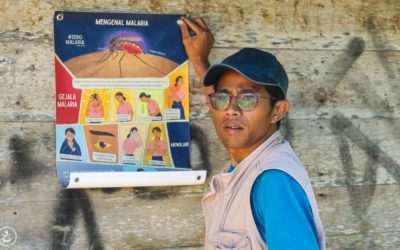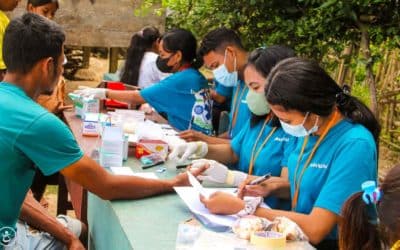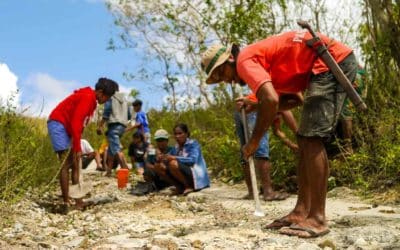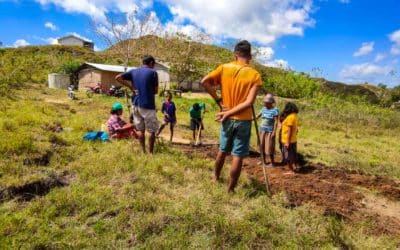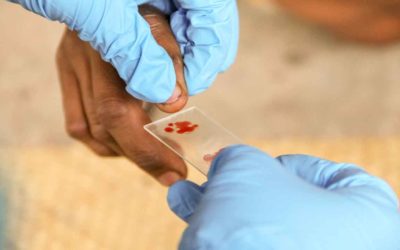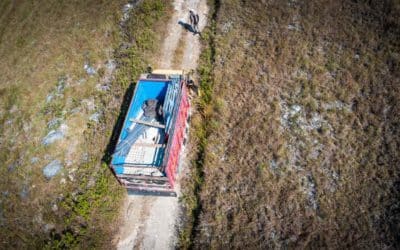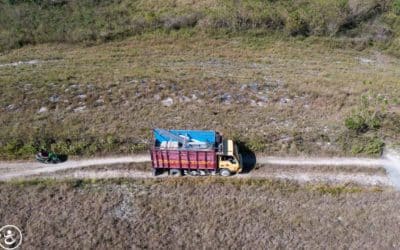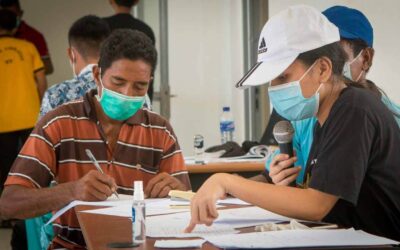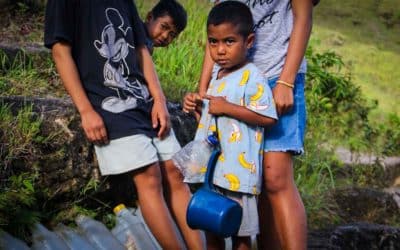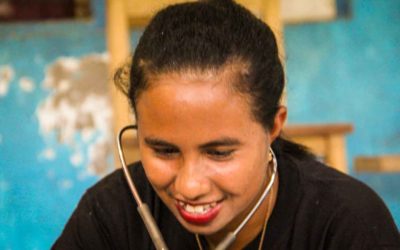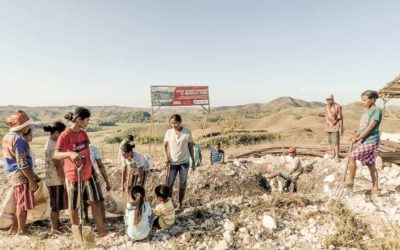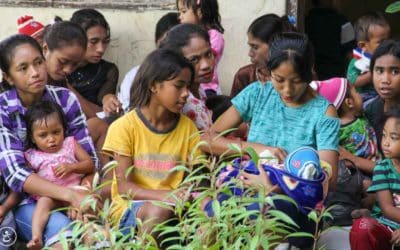Fair Future Foundation, in collaboration with Kawan Baik Indonesia and Sumba Volunteer, is working to combat malaria in the highly affected region of East Sumba, Indonesia. Through their program, they aim to provide screening, prevention, and treatment to the remote village of Laindatang. The mission seeks to save lives and target vulnerable groups, such as children and pregnant women. Join them in their fight against malaria and help make a difference in East Sumba.
Through the Primary Medical Care program, Kawan Sehat health workers provide treatment for fevers, wounds, and malaria in villages lacking access to doctors. They carry essential medicines, adhere to established medical protocols, and refer emergency cases promptly to prevent delays in care.
Donate
Support Care
Programs
All projects
Quick News
Field updates
Stories
Field stories
The #ZeroMalaria Program in Laindatang, East Sumba
The access to the village is a hope for a better life
Discover the remarkable progress in our ongoing construction and repair efforts on the road to Laindatatang village in East Sumba. The Fair Future Foundation has been at the forefront, meticulously coordinating and overseeing this significant project for months. We’re thrilled to share that material trucks and tanker trucks can now effortlessly reach the village.
Repair of access to Laindatang village
The #ZeroMalariaSumbaTimur program has been successfully implemented
In a concerted effort to fight the endemic scourge of malaria, the Swiss Fair Future Foundation has embarked on an extraordinary mission – the #ZeroMalariaSumbaTimur program. This groundbreaking initiative is taking place in the heart of Southeast Asia, specifically in the remote and underserved eastern expanse of Indonesia known as East Sumba.
Having already screened and treated 2500 individuals across three severely malaria-affected villages in East Sumba, our undertaking is underscored by a tangible impact. This formidable feat, orchestrated through the synergy of committed individuals such as Alandio, Ino, Elthon, Alex, Ayu, Annisa or Ayu, resonates as a testament to unwavering dedication. Over seventy staunch contributors, bolstered by fifty fervent volunteers from diverse corners of Indonesia, assemble with a shared sense of purpose.
Collectively, we have curated a multi-disciplinary team of skilled nurses, physicians, and laboratory specialists, amplifying our medical outreach. This coalition is complemented by clever logistics and data management, facilitated by an innovative application collaboratively developed by the Fair Future and Kawan Baik Foundations.
The core of our effort extends beyond the simple detection of malaria; our priority lies in education and prevention. Empowering communities with knowledge and awareness is our ultimate goal. We disseminate vital information about this dangerous disease through immersive workshops and interactive sessions. Armed with this understanding, individuals cannotntify the symptoms of malaria but also take quick and informed action to avoid potential complications and even death, safeguarding their well-being and others—their relatives.
The tangible impact of this initiative ripples through the lives we touch. Early identification and effective malaria management have resulted in life savings. Additionally, our efforts extend to enlightening local healthcare providers, equipping them with the essential tools and resources for a decisive battle against this relentless disease.
Yet our journey is not free of challenges. Negotiating the region's labyrinthine topography, working with limited resources, and transcending language barriers requires inventive methodologies and a deep sensitivity to indigenous cultures. Establishing a foundation of trust within our communities is an indispensable facet, fostering the adoption of preventive measures and a tendency to seek prompt medical intervention when needed.
We invite you to join our collective effort in the fight against malaria. Hand in hand, we can create a transformative impact, save lives and shape a radiant tapestry of possibility for everyone.
Awesome! The first loaded truck arrives at Laindatang
This new "Picture of the Day" shows you the truck climbing the steep slope that leads to the village of Laindatang, which is ultra isolated, where a hundred families live without electricity, water, and very little food. This first truck transports construction materials and healthy sanitary facilities, which our teams have manufactured at the Rumah Kambera base camp.
We're excited to announce a significant milestone in our mission to create a positive impact! Despite facing difficult conditions and encountering broken promises, our unwavering dedication to improving the lives of impoverished villagers has prevailed. After days of arduous road repairs, we are proud to share that a truck laden with essential construction materials has finally reached the remote village of Laindatang. This remarkable achievement, made possible through the unwavering support and resilience of the villagers, marks a crucial step in providing vital resources and support to a community lacking necessities.
The road to the village presented numerous challenges, with its treacherous slopes and slippery terrain. Our team, armed with determination and their bare hands, overcame these obstacles with unwavering resolve. Though we encountered setbacks, including a failed attempt and broken bolts, our determination never wavered.
Two months ago, we were promised assistance by the department responsible for road infrastructure, but regrettably, their support never materialized. Nevertheless, we refused to be deterred from our mission of bringing essential resources and support to the impoverished villagers, who live in extreme poverty, deprived of electricity, clean water, and sanitation facilities – Ref: Water Connections Program here.
Yesterday, as the truck conquered the treacherous slopes, an overwhelming sense of joy and accomplishment washed over us. It was a moment that infused hope and happiness into the previously isolated village of Laindatang. I was moved to tears, knowing that I had dedicated nearly a year of my life to bringing this project to fruition.
Quite a performance: The first loaded truck arrives at Laindatang
Together, we are joining forces in a powerful effort to combat malaria
A collective initiative against malaria is currently underway in East Sumba, Indonesia. Fair Future, kawan baik, and Sumba Volunteers have joined forces with over 100 volunteers, including doctors, nurses, laboratory technicians, water experts, builders, and government officials. Their primary objective is to eradicate malaria entirely within a practical period, focusing on prevention, diagnosis, and treatment methods.
The #WaterConnections project in Laindatang has started!
In this new "Picture of the Day", we witness the difficulties faced by young children in East Sumba as they search for clean water. These children must travel quite a distance from their homes to reach the kullups (small stone basins dug directly into the rocky terrain by villagers to collect and hold rainwater in rural areas). Unfortunately, it is unlikely to rain for the next nine months, and the children must walk over ten kilometres to obtain just a few litres of water to sustain themselves; kullups are dry now.
Presently, families in Laindatang endure arduous journeys, spanning miles and lasting over 10 hours, to obtain meagre quantities of drinking water. With a daily allocation of fewer than 2 litres per person, individuals must make profound sacrifices as this limited supply must accommodate drinking, eating, personal hygiene, and sanitation needs.
Malaria ravages the village, exacerbating the adverse effects of infectious diseases, particularly among children under five. The urgency of the health crisis necessitates immediate intervention. In collaboration with Kawan Baik and local authorities, Fair Future is committed to launching a comprehensive Water Connections project, addressing the pressing need for clean water in the village with utmost urgency.
Commencing at the end of June 2023, Fair Future embarks on an extraordinary #waterconnections project in Laindatang. This initiative heralds a transformative change and instils immense pride within our organization.
Laindatang residents rely on rainwater collection during the rainy season to meet their clean water requirements. However, limited knowledge and resources impede this method, significantly contaminating water reservoirs. During the dry season, their options are limited to accessing water from the Kulub—an artificial pool nestled within a rock formation—or purchasing tank water from a select few companies.
Regrettably, accessing water becomes increasingly challenging throughout the year, with only a handful of companies willing to deliver to the village. Transport obstacles frequently result in spilt water, further diminishing the already scarce supply upon arrival in Laindatang.
For the villagers, access to clean water is a matter of survival. They currently store rainwater in unclean, contaminated, and hazardous tanks. Though this remaining water sustains them for drinking, eating, and survival, it will be depleted within weeks as the dry season commences. Tragically, this water is tainted, infected, and carries life-threatening diseases such as Malaria, Cholera, Dengue, Typhoid fever, Hepatitis A, and Guinea worm disease. Additionally, prevalent diarrheal diseases like E. coli and rotavirus, caused by contaminated water, pose a severe risk, particularly to children, leading to dehydration and even death.
You have the power to help us realize this vital project, which is indispensable for hundreds of families. If you desire, your generous donation dedicated to the #waterconnections project in the village of Laindatang would be warmly welcomed. We extend our heartfelt gratitude and appreciation to all those willing to contribute. With your support, we can bring love, hope, and clean water to the deserving community of Laindatang.
To access information about our implementation, you can download and read the presentation in PDF format by clicking this link.
Strong women representing a strong nation
This is #RebuildMbinudita Program
Malaria Program – Preparing and Mobilizing Resources
As we mentioned in last week’s newsletter, Fair Future Foundation, Kawan Baik Indonesia, and Sumba Volunteer are joining forces to launch a crucial health and medical operation to combat malaria in the Mahu region of East Sumba, Indonesia. The “Malaria Prevention Initiative 2023 – Sumba Timur 2023” aims to prevent, detect, and treat this devastating disease in one of the most affected regions. Malaria has become endemic in this area, establishing itself and finding a conducive environment for its spread, leading to an unprecedented increase in cases in recent months.




